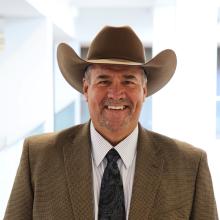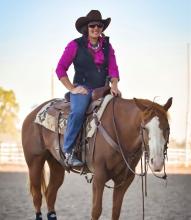Faculty




Staff

Sign up for Fall 2025 Registration Day Registration Day | Northeastern Junior College
The equine industry in the United States is a growing, dynamic sector of agriculture with a broad spectrum of jobs expanding within the industry. The Equine Management program is designed to provide the students with the basic skills and background knowledge necessary for entry level employment as trainers and assistant trainers in the horse industry.
Students applying to the program must go through an oral interview and a practical riding test before admission to the program is granted. These are scheduled between November and March of the year prior to admission into the program. We suggest that the prospective students apply to Northeastern Junior College first, and then try to schedule a campus visit along with their interview and riding test.
In Northeastern's horse training portion of the program, freshman students are assigned young horses that have already been started. Many of these horses have already been through our colt starting class here at Northeastern. The second semester of the freshman year and both semesters of the sophomore year, students will start and train a young horse themselves. These young horses are sent to us from a large geographic area as well as members of our local community. We treat our program as if it were a training facility. Our students are responsible for general care of their assigned horses on a daily basis including billing and any health care that is necessary. We are proud of the great reputation of our colt starting program. This reputation allows us to continually provide quality horses for our students to advance their skills.
Our two year program provides students access to the business, economic, technical and general education classes necessary to become competent managers. Practical experience is provided in many of the classes as well as the internship portion of the program.
It is very important to us here at NJC that we provide a positive internship experience. We try to direct our students to an internship sponsor with a great history and a strong background working with students. In many cases these internship opportunities result in long-term employment.
For more information contact: Cole Briggs - cole.briggs@njc.edu or 970-521-6785.
Program Learning Outcomes:
| Course Number | Course Title | Credits | Details |
|---|---|---|---|
ASC102ASC1102 |
Introduction to Equine Science | 4 | |
|
This course covers the basics of the equine industry, breeds, selection, form to function, care and management, soundness, health, reproduction, feeding, facilities, physiology, production systems, and management systems. (3-2) |
|||
ENG115ENG1015 |
Technical English & Communication | 3 | |
|
Focuses on the written and oral communication needs of students in vocational and technical fields. Enables the student to practice written, oral, reading, reasoning, and interpersonal communication skills in order to become successful (or to remain successful) in the workplace. (3-0) |
|||
EQM101EQM1001 |
Stable Operations I | 1 | |
|
Focuses on the routine daily care, grooming, feeding, stable sanitation, daily health, and feed records of horses. Prerequisite: EQM or stall facility. (0-10) |
|||
EQT101EQT1001 |
Introduction to Horse Training | 5 | |
|
Introduces handling and care of horses. Basics of grooming, hoof care, showing at halter, equitation, and horsemanship will be covered. Prerequisite: EQM Major (1-8) |
|||
MAT107MAT1140 |
Career Math: Program Emphasis | 3 | |
|
Agriculture Emphasis - Covers material designed for career and technical students who need to study particular mathematical topics. Topics include measurement, algebra, geometry, statistics, and graphs. These are presented at an introductory level and the emphasis is on applications. Prerequisite: Successful completion of MAT0250 or MAT0300 with a "C" grade or better or appropriate placement scores. (3-0) Wind/Welding Emphasis - Covers material designed for career and technical students who need to study particular mathematical topics. Topics include measurement, algebra, geometry, and graphs. These are presented at an introductory level and the emphasis is on applications. Prerequisite: Successful completion of MAT0250 or MAT0300 with a "C" grade or better or appropriate placement scores. (3-0) |
|||
| Course Number | Course Title | Credits | Details |
|---|---|---|---|
ASC100ASC1100 |
Animal Sciences | 3 | |
|
Covers the basic fundamentals of livestock production including the principles of nutrition, reproduction, breeding, genetics, health, and physiology of cattle, sheep, swine, horses, and other farm species. Trends and issues in animal science and animal agriculture are also discussed in this course. (3-0) |
|||
EQM102EQM1002 |
Stable Operations II | 1 | |
|
Builds on EQM1001 and continues focus on the routine daily care, grooming, feeding, stable sanitation, daily health, and feed records of horses. Prerequisite: EQM or stall facility. (0-10) |
|||
EQM158EQM1058 |
Equine Reproduction | 2 | |
|
Introduces horse reproduction and the various breeding and management practices found on breeding farms. Covers physiology of the mare and stallion reproductive systems, care of the stallion and the mare, mare heat detection, breeding, care of pregnant mares, foaling, problems in the foal, and care of the foal and yearling. (2-0) |
|||
EQT102EQT1002 |
Beginning Colt Training | 6 | |
|
Covers an advanced level of horsemanship involving lead changes, turn arounds, and roll backs will be covered. Students that meet minimum skills requirements may continue into specialized areas of riding. Prerequisite: Successful completion of EQT1001 with a "C" grade or better. (0-10) |
|||
|
Choose one of the following courses. |
|||
AGB102AGB1002 |
Foundations of Agricultural business | 3 | |
|
Focuses on the foundational aspects of the primary agriculture business areas including economics, management, marketing, sales, and finance in an applied manner. Current events in agriculture are discussed with emphasis on application to agribusiness. (3-0) |
|||
AGE102AGE1102 |
Agriculture Economics: GT-SS1 | 3 | |
|
Focuses on economic principles and decision-making by consumers, firms, and government with emphasis on their application to the food, fiber, and natural resource sectors of the economy. This is a Statewide Guaranteed Transfer course in the GT-SS1 category. (3-0) |
|||
| Course Number | Course Title | Credits | Details |
|---|---|---|---|
AGB228AGB2028 |
Agribusiness Management | 3 | |
|
Provides the student with basic management principles and practical experience in applying principles of economics, business, marketing, and finance to the management of an agri-business operation. (2-1.5) |
|||
ASC225ASC2125 |
Feeds and Feeding | 4 | |
|
A study of the basic nutrients, common feeds, and feed additives fed to livestock, anatomy of digestive systems, and basic feeding practices for beef, sheep, swine, horses, and dairy. The lab portion of this class will be devoted to calculating and balancing rations to fulfill nutrient requirements for farm animals for growth, finishing, reproduction and lactation, and work. Prerequisite: Successful completion of ASC1100 with a "C" grade or better. (3-2) |
|||
EQM210EQM2010 |
Equine Health | 2 | |
|
Assists students in planning annual equine health programs. Introduces students to methods of prevention, recognition, and treatment of common equine diseases. (2-0) |
|||
EQM211EQM2011 |
Equine Health Lab | 1 | |
|
Application of practical skills, methods, and techniques used to prevent and treat equine diseases and health problems. (0-1.5) |
|||
EQM201EQM2001 |
Stable Operations III | 1 | |
|
Familiarizes the student with the routine daily care, grooming, feeding, stable sanitation, daily health, and feed records of horses. Prerequisite: EQM or stall facility (0-10) |
|||
EQT201EQT2001 |
Intermediate Colt Training | 6 | |
|
Covers halter breaking weanlings. Students will also receive instruction in longing, driving, saddling, and riding the two year old. Prerequisite: Successful completion of EQT1002 with a "C" grade or better. (0-10) |
|||
| Course Number | Course Title | Credits | Details |
|---|---|---|---|
AGB218AGB2018 |
Computerized Farm Records | 3 | |
|
Emphasizes the planning and development of record keeping systems, the interpreting and analyzing of agricultural business records, balance sheets, cash flows, and income statements with the aid of a computer. (3-0) |
|||
AME105AME1005 |
Basic Ag Mechanic Skills | 2 | |
|
Includes safety, proper tool use, tool reconditioning, A.C. electricity, D.C. electricity, domestic water supply, and farm sanitation systems. (1-2) |
|||
EQM202EQM2002 |
Stable Operations IV | 1 | |
|
Familiarizes the student with the routine daily care, grooming, feeding, stable sanitation, daily health, and feed records of horses. Prerequisite: EQM or stall facility (0-10) |
|||
EQM289EQM2089 |
Equine Management Capstone | 0.5 | |
|
Covers information necessary for employment and job search skills. Students will receive instruction in resume writing and interviewing. Prerequisite: Sophomore Equine Students (.5-0) |
|||
EQT202EQT2002 |
Advanced Colt Training | 6 | |
|
Gives the student their final experience at starting and management of a young horse to meet the industry standards for which they are entering. Prerequisite: Successful completion of EQT2001 with a "C" grade or better. (0-10) |
|||
MAN205MAN2005 |
Event Planning: Equine | 3 | |
|
Introduces the components of meeting planning, organization, personnel, finances, site selection, transportation, program design, promotion, arrangement of exhibits, and evaluation. (3-0) |
|||
| Course Number | Course Title | Credits | Details |
|---|---|---|---|
EQM280EQM2080 |
Equine Internship | 8 | |
|
Students are employed or work at home on an equine operation. The work experience must cover a minimum of 320 hours with the student involved in all facets of this operation. Prerequisite: EQM major |
|||




